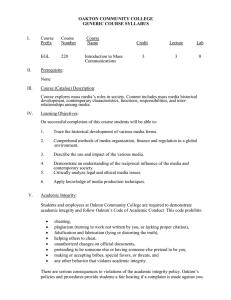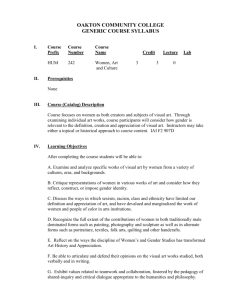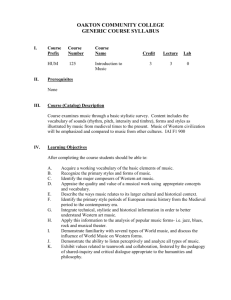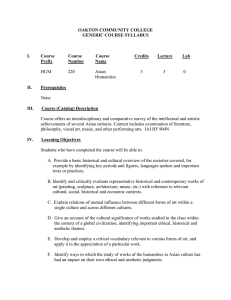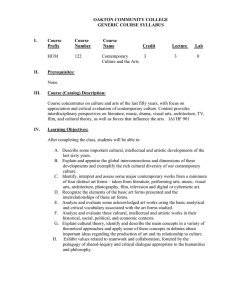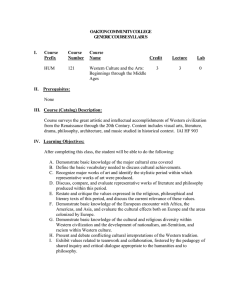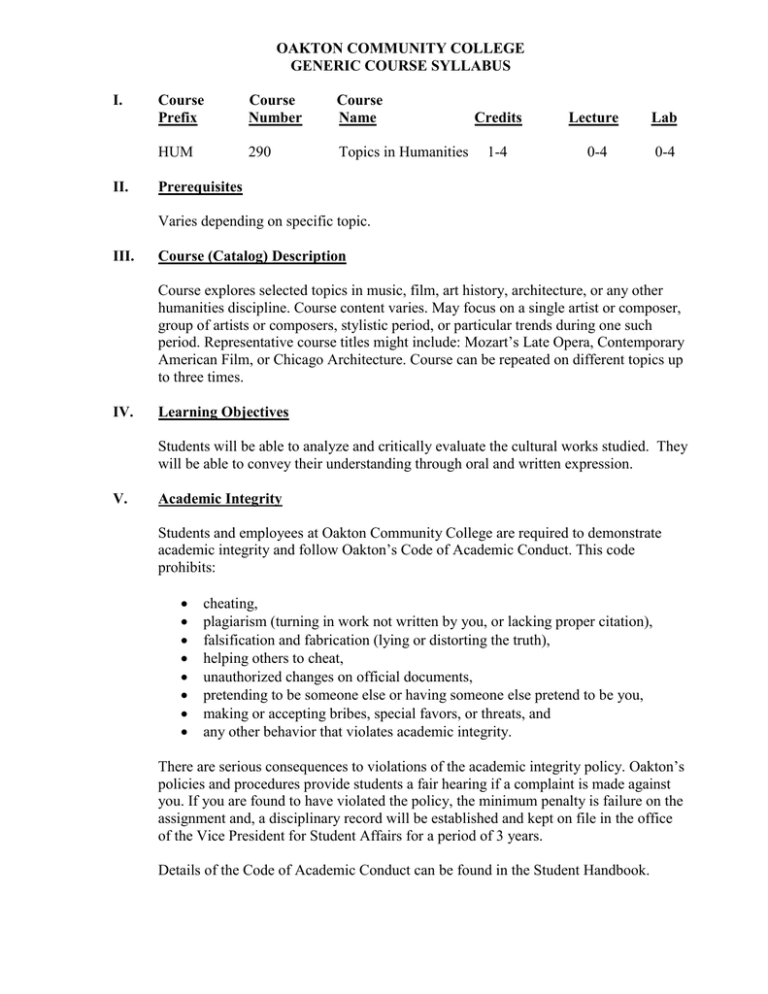
OAKTON COMMUNITY COLLEGE
GENERIC COURSE SYLLABUS
I.
II.
Course
Prefix
Course
Number
Course
Name
HUM
290
Topics in Humanities
Credits
Lecture
Lab
1-4
0-4
0-4
Prerequisites
Varies depending on specific topic.
III.
Course (Catalog) Description
Course explores selected topics in music, film, art history, architecture, or any other
humanities discipline. Course content varies. May focus on a single artist or composer,
group of artists or composers, stylistic period, or particular trends during one such
period. Representative course titles might include: Mozart’s Late Opera, Contemporary
American Film, or Chicago Architecture. Course can be repeated on different topics up
to three times.
IV.
Learning Objectives
Students will be able to analyze and critically evaluate the cultural works studied. They
will be able to convey their understanding through oral and written expression.
V.
Academic Integrity
Students and employees at Oakton Community College are required to demonstrate
academic integrity and follow Oakton’s Code of Academic Conduct. This code
prohibits:
cheating,
plagiarism (turning in work not written by you, or lacking proper citation),
falsification and fabrication (lying or distorting the truth),
helping others to cheat,
unauthorized changes on official documents,
pretending to be someone else or having someone else pretend to be you,
making or accepting bribes, special favors, or threats, and
any other behavior that violates academic integrity.
There are serious consequences to violations of the academic integrity policy. Oakton’s
policies and procedures provide students a fair hearing if a complaint is made against
you. If you are found to have violated the policy, the minimum penalty is failure on the
assignment and, a disciplinary record will be established and kept on file in the office
of the Vice President for Student Affairs for a period of 3 years.
Details of the Code of Academic Conduct can be found in the Student Handbook.
Generic Course Syllabus
HUM 290
VI.
Page 2
Outline of Topics
Examples of possible topics for this course are as follows:
Film: “The Horror Film”
The horror film is one of the oldest genres in film history and also one of the most
popular, but there is more to a scary movie than a good scream. Rich with meaning and
history, the horror films reveal much about our culture and society. The genre is also
one of the most visually driven, making the horror film a fascinating study in lighting,
set design, and costuming. This course will explore the visual conventions and styles
of the horror film plus relate the genre to the preoccupations, fears and desires of our
culture.
Opera:
This class will explore the evolution of opera from its roots in Greek Tragedy and the
Western Theater tradition to its most mature form in the works of the modern masters.
The history of opera and the development of composition form and performance
practice will be studied in depth. Biographical information on the great composers,
singers, writers and impresarios will also be reviewed. Examples of operas from every
pre-20th century period and the artistry of the greatest performers will be presented in
recordings and videos.
VII.
Methods of Instruction
Course may be taught as a face-to-face, media-based, hybrid, or online course.
Methods of instruction may include lecture, class discussion, small group discussion,
student presentations, and films. Field trips may be required. The specific methods
will be noted on the syllabus.
VIII. Course Practices Required
Students must be required to read college level works of cultural analysis and must be
required to write at least 15 typed pages of material. This writing may take the form of
a long term paper or several shorter critical papers. Students may be required to defend
their views in class discussion and in formal presentations. There may be several inclass essay exams.
IX.
Instructional Materials
Note: Current textbook information for each course and section is available on
Oakton’s Schedule of Classes.
Materials will be assigned according to the specific course focus. Normally, students
will be reading substantial works of cultural analysis rather than introductory
anthologies or texts.
D:\219545200.doc
Generic Course Syllabus
HUM 290
X.
Page 3
Methods of Evaluating Student Progress
Exams, quizzes, papers, journals, oral presentations, group work, and class participation
may all be used to evaluate student learning. (The weight of each assignment or exam
in calculating the final grade must be specified in the syllabus.)
XI.
Other Course Information
A.
Disabilities
If you have a documented learning, psychological, or physical disability you may
be entitled to reasonable academic accommodations or services. To request
accommodations or services contact the Access and Disability Resource Center at
the Des Plaines or Skokie campus. All students are expected to fulfill essential
course requirements. The College will not waive any essential skill or requirement
of a course or degree program.
B.
Discrimination
The Oakton Community College Catalog states:
Oakton Community College does not discriminate on the basis of race, color,
creed, religion, national origin, disability, age, sex, sexual orientation, or marital
status in admission to and participation in its educational programs, activities and
services, or employment practices. The College does not tolerate sexual
harassment or sexual assault by or of its students or employees.
In keeping with this policy of tolerance and non-discrimination, in this class all of
us (myself included) should strive to listen and give careful consideration to all
ideas expressed in class, especially those that are different from our own, without
attacking or demeaning the people who have those views. We should also strive to
avoid using insulting terms or telling offensive jokes when talking to or about
individuals or groups.
C.
Instructor information
Office and office hours:
Phone
Email and website
Approval Dates:
(Faculty: Do not include the following information on your individual syllabi created for class
distribution.)
Effective beginning term: Fall 2013
Ending term:
Syllabus prepared by: Hollace Graff
Date: April 23, 2001
Revised by:
Date:
Reviewed by Chair: Hollace Graff
Date: March 2006
D:\219545200.doc
Generic Course Syllabus
HUM 290
Approval by Dean: Linda A. Korbel
D:\219545200.doc
Page 4
Date: June 2013

